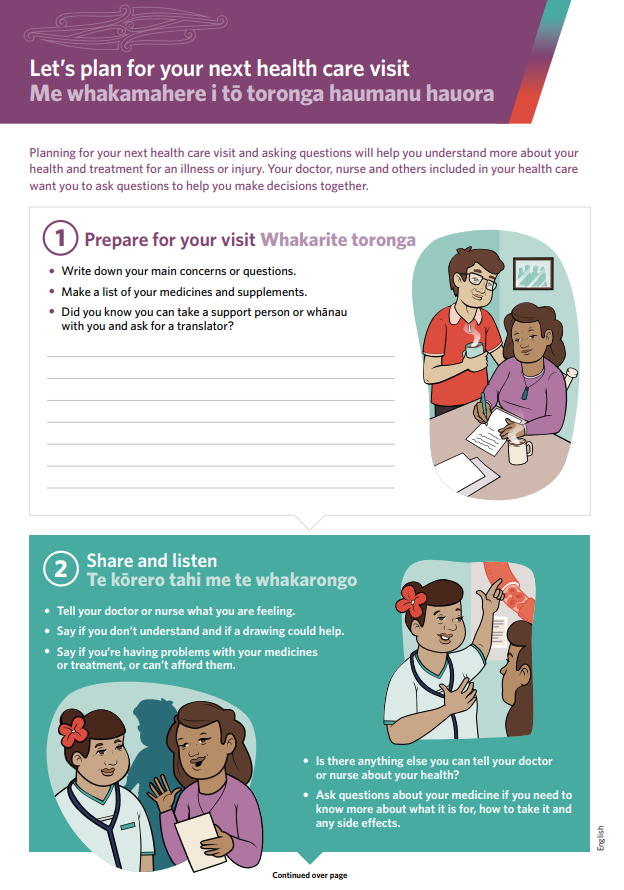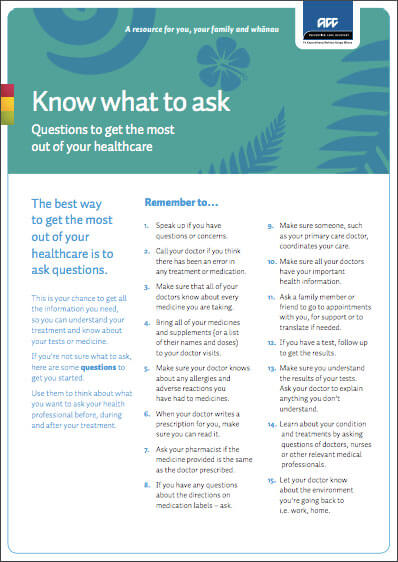You can now add Healthify as a preferred source on Google. Click here to see us when you search Google.
Healthcare provider visits
Make the most of your healthcare appointment
Key points about getting the most out of your healthcare appointments
- Many GP, nurse or other healthcare appointments are only 10 to 15 minutes long and it’s easy to leave feeling like you haven’t covered everything you wanted to.
- Sometimes they can feel rushed and you may have forgotten to ask questions or discuss important matters with your healthcare provider
- So how do make the most of the time you have?
- Here are some tips for getting the most out of your visit to your healthcare providers. These apply to telehealth appointments as well.

Before your appointment, take some time to write down all of your symptoms and how long you’ve had them. You may think you’ll remember them once you’re at your appointment, but it’s so easy to forget things once you’re there. It’s also a good idea to remind your healthcare provider of any relevant medical history.
It's also helpful to be prepared to talk about other things that might be troubling you that can affect your health. Maybe you're not as good at getting around as you used to be, are feeling a bit down, or have a new ache or pain affecting your sleep. Perhaps you're struggling to keep your house and garden under control or have a partner who snores. Your healthcare provider may well be able to help, but they can't help if they don't know what you're dealing with. Make a list of these broader aspects of life as well.

Image credit: Depositphotos
If you have a lot going on, or haven't seen a healthcare provider for a while, think about booking a double appointment slot to have more time to talk.
When booking your appointment with your healthcare provider you can ask if there is a Health Coach or Health Improvement Practitioner available at your clinic and if they're available to see on the same day for some free extra support.
Before your appointment, write down any questions you might have. It’s so easy to refer to a list once you’re there. Remember, there’s no such thing as a silly question. If you don’t understand something, ask them to explain it to you. Health issues can sometimes be complicated and hard to understand so it’s completely normal to ask for something to be explained more simply.
There's a really good resource developed by the Health Quality & Safety Commission, NZ called 'Let's plan for your next healthcare visit'(external link). It's also available in other languages (see the more information section below).
Prepare for your visit
- Write down your main concerns or questions.
- Make a list of your medicines and supplements. This is particularly important if you're seeing a healthcare provider at an urgent care or walk in clinic. They may not have your medical history and medication records if you're not registered with them and you need care outside normal hours. If you're seeing your usual healthcare provider and are experiencing any side effects from new medicines you're taking, it’s a good idea to note these down before your appointment as well. Take your list to discuss with your healthcare provider so they can provide appropriate support.
- If you need help understanding English, did you know you can take a support person with you or ask for a translator? If you need a translator, and don't have a support person who can translate for you, it's best to contact your healthcare provider before your booked appointment and ask them to organise a translator for you. There may be someone in the healthcare team who can speak the same language as you and translate during your health care appointment. This could be a nurse, receptionist, health coach or health improvement practitioner. Other translation options are available.
Listen and share
- Say if you don’t understand (eg, your condition, medicines, treatment) and ask your healthcare provider to explain things in a different way. This might be by using simpler words, speaking more slowly or using a drawing.
- Say if you’re having problems with your medicines or treatment and ask what you can do, if there's any support available, or if there may be other options. If cost is a problem, ask if you're eligible for a high user health card(external link).
- Is there anything else you can tell your doctor or nurse about your health or family history?
- Let your healthcare provider know if you're taking any herbal or alternative medicines as well as the ones they've prescribed for you. This is important to make sure they are not causing any harm to your health and wellbeing.
Ask questions
- What is my health problem?
- What happens next?
- What kind of checks or tests do I need to have regularly to manage my health conditions or overall health?
- Why is that important?
- Are there any other options?
- What can I do to help with my health?
- Are there free services provided by the clinic to help me improve my health?
- What if I don't want to take medications or feel scared about them, what can I do?
Note down what you need to do next
- There's a section to write your P.L.A.N. on the factsheet(external link).
Going to see your healthcare provider can make you feel anxious or overwhelmed, especially if your appointment is about something you’re worried or embarrassed about. Having somebody there to support you can help you relax and feel more at ease. It's also another set of ears to pick up parts of the discussion you might not understand. You can choose to share the list of things you want to cover with your friend or whānau member and they can help remind you to ask all your questions.

Image credit: Healthify He Puna Waiora
At the end of your appointment, ask your healthcare provider for a summary of what’s been discussed. Repeat it back so you’re sure you’ve understood it properly. It’s often a good idea to get them to write down information or print out any information sheets that are relevant to you, especially about your medication or your health condition, so you can take it home to read.
Your healthcare provider might suggest a test, procedure or treatment plan. Choosing Wisely Aotearoa recommends 4 questions you can ask when discussing test, treatment or procedure options for you or your whānau.
1. Do I really need this test, treatment or procedure?
Discuss with your healthcare provider what the test, treatment or procedure is, what it involves, why they have suggested it and whether it’s necessary or not. Ask about waiting times and any costs involved.
2. What are the risks?
Ask if there are any risks involved and weigh those up. Are there any side effects? Talk about what would happen if you do, or don’t have the test, treatment or procedure. Ask about the accuracy of results and whether you could you get a false positive or false negative result.
3. Are there simpler, safer options?
Talk about alternative tests, treatments or procedures. Maybe a lifestyle change such as exercising more, cutting back on alcohol or eating healthier food is all that’s needed.
4. What happens if I don’t do anything?
Ask what would happen if you don’t have the test, treatment, procedure or medicine right away, or at all. Would your condition get worse or better? What are the risks of delaying it or not doing it at all?
Sometimes it can be a bit embarrassing discussing things to do with your body or answering certain questions. However, it’s really important that you tell the truth. Not telling the truth can be harmful as it can affect your diagnosis and care, or cause further issues if you have medications that don't mix, or symptoms you haven't talked about. If you lie or omit the truth, you’re only hurting yourself. And remember, your healthcare professional has heard and seen it all before!
If you aren't already using a patient portal, ask if your GP practice is offering this e-service. A patient portal is a convenient, secure online website where you can view your health record anytime and interact with your healthcare providers. Patient portals streamline communication between patient and provider, giving you more control over your own healthcare.
Video: How to get the most out of your general practice visit (with captions)
(Healthify He Puna Waiora, NZ, 2020)
Video: Getting the most out of your General Practitioner GP appointment
Unnecessary tests do not add value to you or your whānau(external link) Choosing Wisely, NZ
Visiting a doctor or a nurse(external link) Health New Zealand | Te Whatu Ora
Find a doctor(external link) New Zealand Government
Resources
Let’s plan for your next health care visit(external link) HQSC, NZ, 2023 available in the following languages English(external link), te reo Māori(external link), Samoan(external link), Tongan(external link), Chinese (simplified)(external link), Cook Islands Māori(external link), Fijian(external link), Hindi(external link), Kiribati(external link), Niuean(external link), Rotuman(external link), Tokelauan(external link), Tuvaluan(external link)
Know what to ask – questions to get the most out of your healthcare(external link) ACC, NZ, 2016
References
- Unnecessary tests do not add value to you or your whānau(external link) Choosing Wisely, NZ
- Getting the most out of your General Practitioner GP appointment(external link) Listening to Families, NZ, 2023 (video)
- How to get the most out of your general practice visit(external link) Healthify he Puna Waiora, NZ, 2020 (video)
- Let’s plan for your next health care visit(external link) HQSC, NZ, 2023
- Visiting a doctor(external link) Health New Zealand | Te Whatu Ora, NZ
Brochures
Credits: Healthify editorial team. Healthify is brought to you by Health Navigator Charitable Trust.
Reviewed by: Roselyn Singh, Health Coach, Auckland.
Last reviewed:







